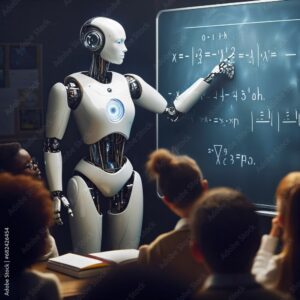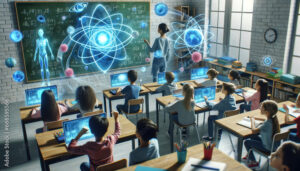Web 3.0 – A bold new adventure or a web of danger?
When looking at the evolution to Web 3.0, we can see the influence of this new technology on our students and education on the whole. As Gerstein states, “The Web, Internet, Social Media, and the evolving, emerging technologies have created a perfect storm or convergence of resources, tools, open and free information access.” This concept, while virtuous in theory, tends to be less than perfect when in practice.
When considering the advantages of Web 3.0 being integrated and advancing education, we could see a monumental shift in the way that information is shared. If we were to include VR and AR in the classroom, we could allow our students to “explore” the locations we are discussing in class. As Brianne mentioned, our classes could experience the tombs of Egypt without ever having to leave the classroom. We could recreate the world during different centuries, so people could experience the world as it once was. The level of learning through experience could be irreplaceable.
As we continue to explore the idea of Web 3.0, we need to describe the dangers of decentralization and putting our faith in blockchains and end-to-end encryption. While it sounds safe, because of the community network that is built, there are many workarounds and codes embedded to decrypt and infiltrate your system. There is also no recourse if there is a data breach. Currently, if a company has a data breach, there are backups and insurance which fund the (inevitable) lawsuits for data loss. If we decentralize this information, it is possibly “more secure” but the data breaches could be more devastating; not necessarily in the information sector, but also in the financial sector.
There is a benefit to the idea of teacher-created blockchains and networks that could be catered to the students, providing them access to not only other peers around the world to learn from but also professionals and experts in the field of focus for each subject. Creating a specialized network for the students (which focuses on their interests) could deepen and enrich their education. However, I would be remiss if I did not mention the dangers of creating echo chambers with these networks. As we saw during COVID when people only listen to the subject matters and beliefs of those whom they find interesting and relevant, we begin to isolate and (for a lack of a better term) indoctrinate these views and beliefs. With the increased anonymity of Web 3.0, misinformation and malevolent intentions are nearly impossible to identify and address. The importance of a global community with free speech and centralization is that all opinions are expressed. The concept of individualization of global communication could lead to radicalization and indoctrination in a much larger, and easier facilitated environment.
I may begin to sound like a Luddite for this opinion, but Web 3.0 reminds me of the conspiracy theorists who claim your money is not safe in a bank, and hoard their wealth in their mattresses. It feels like the idea that nothing is safe unless you have control over it. Absolutely, we should have control over our data, but is this really the way to go about creating that control? Is it truly safer to hoard your data in a house that can be broken into or burned to the ground?
This evolution in technology and education will initially only be available to those schools that can afford the technology to purchase the materials, subscriptions and professional development seminars for teachers. Eventually, the goal of Web 3.0 is to become less expensive as more and more users become a part of the network, but it fails to discuss the cost to the users. Nothing is free and school divisions’ budgets are not infinite.
This user-driven learner sounds good in practice, but have you met a 14-year-old? They want to play Minecraft, play basketball, not shower and chat with their friends. For many, they would rather eat Brussels sprouts than read or do math. Gerstein’s article has the hallmarks of an intellect explaining what children need, without understanding what children are like. I get that the world is changing and we need to change with it, but there has to be some level of educational foundation for these kids to build upon. I feel that Web 3.0 has no place in elementary school, or at least it is guided and not entirely “user-driven”. In the end, these are still kids and they need guidance, structure, and routines.
Furthermore, the idea of the educator becoming a guide, cheerleader and resource enabler doesn’t sit well with me. I feel like this is the conservative dream; to create a situation where educators no longer have a specialized role in the classroom, and can be filled by anyone. Even Gerstein hints toward this future, “The educator has more life experience, knows (hopefully) about the process of learning, and has more procedural knowledge about how to find, identify, and use informational resources and social networking for learning purposes.” The inclusion of the word “hopefully” infers there is a place in this reality where teachers are no longer the professional they were once before.

While I can appreciate the sentiments of Gerstein regarding the shift from a fixed to a growth mindset, the reality is that we do have other authorities that we are responsible for. The passive comment of “the learner needs to be central to all teaching endeavours” is the root of our pedagogy. However, we have professional expectations that we are required to meet, or we are fired. The spirit of the last paragraph, while I believe the intention is to be inspiring, comes across as flippant and a blatant disregard for our profession and its standards.
